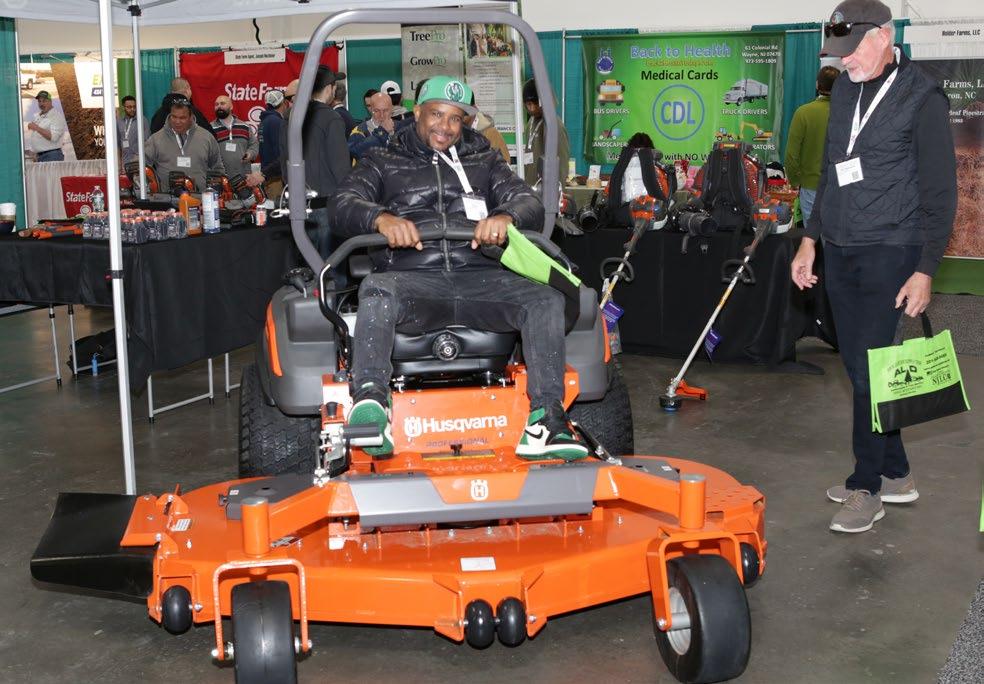The New Jersey Landscape Contractor


3 Step Approach to Recruitment

The Official Publication of the New Jersey Landscape Contractors Association

PARASITOIDS: The Hidden Backyard Beneficials










3 Step Approach to Recruitment

The Official Publication of the New Jersey Landscape Contractors Association

PARASITOIDS: The Hidden Backyard Beneficials







President’s Message
The Buzz
Letter from the Editor
Coming Events
Landscape Achievement Award Winners 2022
Turf Talk
NJLCA Hosts Bergen Community College Landscape Marketing and Sales Students
How to Increase Profits Through Landscaper Safety Training Courses

Parasitoids: The Hidden Backyard Beneficials
Cybersecurity Tips
Landscape AlterNATIVES: Christmas Fern (Polystichum acrostichoides)
Three-Step Approach to Recruitment
Seven Marketing Tactics to Have a Strong Start to Spring
Advertiser Index
Blowing Away Leaf Blower Myths
Wrapping Landscaping and Lawn Care Vehicles
Welcome Members
Contractor Focus: Mikulik Lawn & Landscape
Associate Focus: Fisher & Son Company, Inc.
Tales from the Landscape Side
Landscape New Jersey 2023
The New Jersey Landscape Contractor magazine is the official publication of the New Jersey Landscape Contractors Association, dedicated to the professional landscape industry of New Jersey. NJLCA was founded in 1966 as the Bergen County Landscape Contractors Association, and is today comprised of over 550 member companies throughout New Jersey.
New Jersey Landscape Contractors Association
465 Mola Blvd, Ste. 2, Elmwood Park, NJ 07407 Phone | 201-703-3600 -- Fax | 201-703-3776
E-mail | info@njlca.org
Visit our website at www.NJLCA.org
Publisher/Editor: Gail E. Woolcott
Contributing Writers
Joe Bolognese Jr. | Greg Carpenter | Steven Cesare, PhD. | Chad Diller | Richard Gaynor | Richard Goldstein | Jack Jostes | OPEI | Steven K. Rettke | Gail Woolcott | Steven Yergeau
NJLCA Combined Board
President | Richard Goldstein, CLT
Vice President | Richard Andreu
Treasurer | Hector Escobar
Chairman of the Board | Bob Pedatella
Director | Jeff Baker
Director | Tom Barillo
Director | Kevin Dulio
Director | Justin Flatow
Director | George Futterknecht, CLT
Director | Shawn Kukol
Associate Director | David Gaynor
Associate Director | Rawn Leegwater
Associate Director | Adam Reisboard
Associate Director | AJ Tudda
Advisor | Dr. Steve Fischer, Bergen Comm. College Advisor | Dr. James Murphy, Rutgers University
The New Jersey Landscape Contractor magazine is published triennially. 600 print copies are distributed to members and over 4,000 digital issues are sent to professionals in the Green Industry of New Jersey, as well as educational and governmental institutions. Subscription rates: $45.00 per year; $15.00 per copy. New Jersey residents only, please add 7% sales tax.
To advertise in The New Jersey Landscape Contractor, please contact Gail Woolcott at (201) 703-3600 or e-mail gwoolcott@njlca.org.

Article and photo submissions are encouraged and may be sent to NJLCA at the above address. Publisher assumes no responsibility for safekeeping or return of photos or manuscripts, and reserves all rights to edit material submitted for publication.
© 2021 New Jersey Landscape Contractors Association. All rights reserved. The contents of this publication may not be reproduced by any means, in whole or in part, without the prior written consent of the publisher. The opinions expressed in articles do not necessarily represent the opinions of the NJLCA.
PUBLISHED April 2023
Cover Photo: 2022 Landscape Achievement Award Entries
I would like to take a moment to express my deepest gratitude for your unwavering commitment and support to the NJLCA. Your dedication and contributions have helped us achieve great success and have made a positive impact on the industries we serve.
The recent Landscape New Jersey Trade Show and Conference was once again a resounding success with a sold out floor and happy attendees and exhibitors. We continue to provide the best in education to our attendees and incorporate credits from all sectors of the industry including pesticide, fertilizer, tree, hardscape and landscape industry certification. If there is a topic or speaker you’d like to see at an upcoming trade show or member meeting, please reach out to us to let us know. We want to make your member-
CONGRATULATIONS to all of our Landscape Achievement Award Winners! Below we share our special award winners.

ship as valuable as it can be.
As we continue to grow and evolve, I am excited to invite you to several events that we have planned for the upcoming months. These events will provide opportunities for us to come together, share ideas, and build even stronger relationships They include Member Meetings, the infamous Tony Defeo Annual Pizza Night, our Golf Challenge, as well as something new and exciting.
On August 2nd, we will be hosting our first NJ Contractor’s Showcase and Expo at County College of Morris in Randolph, NJ. Similar to last year’s NOISE event, this outdoor trade show will focus on demonstrations and you having the opportunity to feel, ride and use the equipment that you are considering purchasing. Test drive the latest mowers, excavators, skid steers, chainsaws, weed eaters and more at this one day show. And this time around, the vendors are covering your cost of attendance at the show, so entry is at no cost to you! We will also have food trucks and some indoor education at this great

location. Check out www.njcse.com for all the details and to register!
Whether it’s a networking event, a professional development workshop, or a social gathering, I encourage you to take advantage of all of the opportunities to connect with fellow members and learn from experts in our field.
I look forward to seeing you at our upcoming events and working together to make a difference in our industry . Thank you again for your ongoing support, and let’s continue to achieve great things together!
Sincerely,
Richard Goldstein, President


Contractor of the Year
Chuck Bacon, Greenleaf Lawn & Landscape
Nursery of the Year

Stone House Nursery
Customer Service Award
Richard Cording, CLC Landscaping



Innovator Award
Glenn Ehrgott, Performance Trailers
Landscape Innovation Award
Rich Andreu, Exclusive Stoneworks
Associate of the Year
Braen Supply

Volunteer of the Year
Marco Barrera, Horizon Landscape Co.
Making a Difference Award
Brian Schwartz, I Want to Mow Your Lawn

Budding Contractor Award
R & B Landscaping
Distinguished Service Award
George Futterknecht
MVP Award
Doug Rosenbaum, Native Fields Landscaping


Spotlight Award
Anthony Tarantino, R & B Landscaping
Legislator of the Year

Senate President Nicholas Scutari


Team Player Award
Yesenia Sotomayor
Kodiak Landscape & Design

Welcome to the latest issue of The New Jersey Landscape Contractor magazine. One of my favorite features each year is the Landscape Achievement Awards section. Here we show you the award winners from the most recent Achievement Awards competition and really get to celebrate the amazing artistry and craftsmanship that goes into the work that you do every day.
Please take some time to check out the winning projects and notice some of the newest trends in outdoor living. And of course, take a look at the special awards given out this year to those folks who are really making a difference in our industry (see the page on the left). Thank you to them for all of the hard work and dedication they put into the NJLCA and the industry.
I would like to express my gratitude for your readership and support. We work tirelessly to bring you the most relevant, insightful, and engaging content
possible, and it is always rewarding to see our work being appreciated and enjoyed by our readers.
I also want to encourage you to continue to share your feedback with us. Your comments and suggestions help us to improve the quality of our content and better understand what topics and issues are most important to you. In the coming months, we have some exciting plans for new features, stories, and content that we believe you will find both informative and entertaining. We are always looking for ways to stay ahead of the curve and provide you with fresh, compelling content that reflects the latest trends and developments in our field.
Thank you again for your support, and we look forward to bringing you the best possible content in the future.
Plus, I’m still looking for fun and crazy encounters you have come across working out there each day to include in our
“Tales from the Landscape Side” column. I love to hear the antics you come across, nutty clients, one in a million clients, great employees and vendors with a great story to tell. Please forward your stories to me at gwoolcott@njlca.org. In addition, if you want me to source an article on a particular topic or writer, let me know.
Have a great season!
Sincerely,
 Gail Woolcott, Executive Director Editor of The New Jersey Landscape Contractor
Gail Woolcott, Executive Director Editor of The New Jersey Landscape Contractor

April 13th - Member Meeting at Al D. Landscaping and Tree Supply
April 25th - Annual Service Project
April 28th - NJLCA’s Tony Defeo Annual Pizza Night
May 11th - Member Meeting at Direct Fence Distributors
August 2nd - NJ Contractor’s Showcase Expo
September 7th - Member Meeting at Hionis Greenhouses
October 11th - NJLCA Annual Golf Challenge
October 19th - Member Meeting at Bobcat of North Jersey




December 5th - Holiday Gala and Landscape Achievement Awards
August 2, 2023New Jersey Contractor’s Showcase & Expo in Randolph, NJ



Canete Landscape of Wayne, NJ entered the “Smith - Front Slope & Staircase Replacement” project, designed by Kelly Tuttle, in the 2022 NJLCA Landscape Achievement Awards Landscape Installation without Pool: Up to $25,000, where the project won an Award of Excellence.


They also won an Award of Excellence for their “Matthews - Pool Plantings & Lower Yard Screen” project, also designed by Kelly Tuttle, in the Landscape Installation without Pool: $50,000-100,000 on Page 9.
Canete also won an Award of Distinction for their “Riverhouse 11 Grilling Station”, designed by Dave DaCosta, in the Landscape Installation without Pool: $25,000-50,000.
For more information, visit www.canete.com.









Scenic Landscaping of Haskell, NJ won an Award of Excellence in the 2022 NJLCA Landscape Achievement Awards for the “Outdoor Living Modern Pool Backyard”, designed by Devin Short, in the Installation with Pool: $250,000-500,000 category.






Farmside Landscape and Design of Wantage, NJ won an Award of Excellence in the 2022 NJLCA Landscape Achievement Awards for the “Lakeside Superhost”, designed by Miles Kuperus Jr., in the Installation without Pool: Over $100,000 category.

Farmside also won an Award of Distinction. See pages 18-23. Visit www. farmside.com for more info.
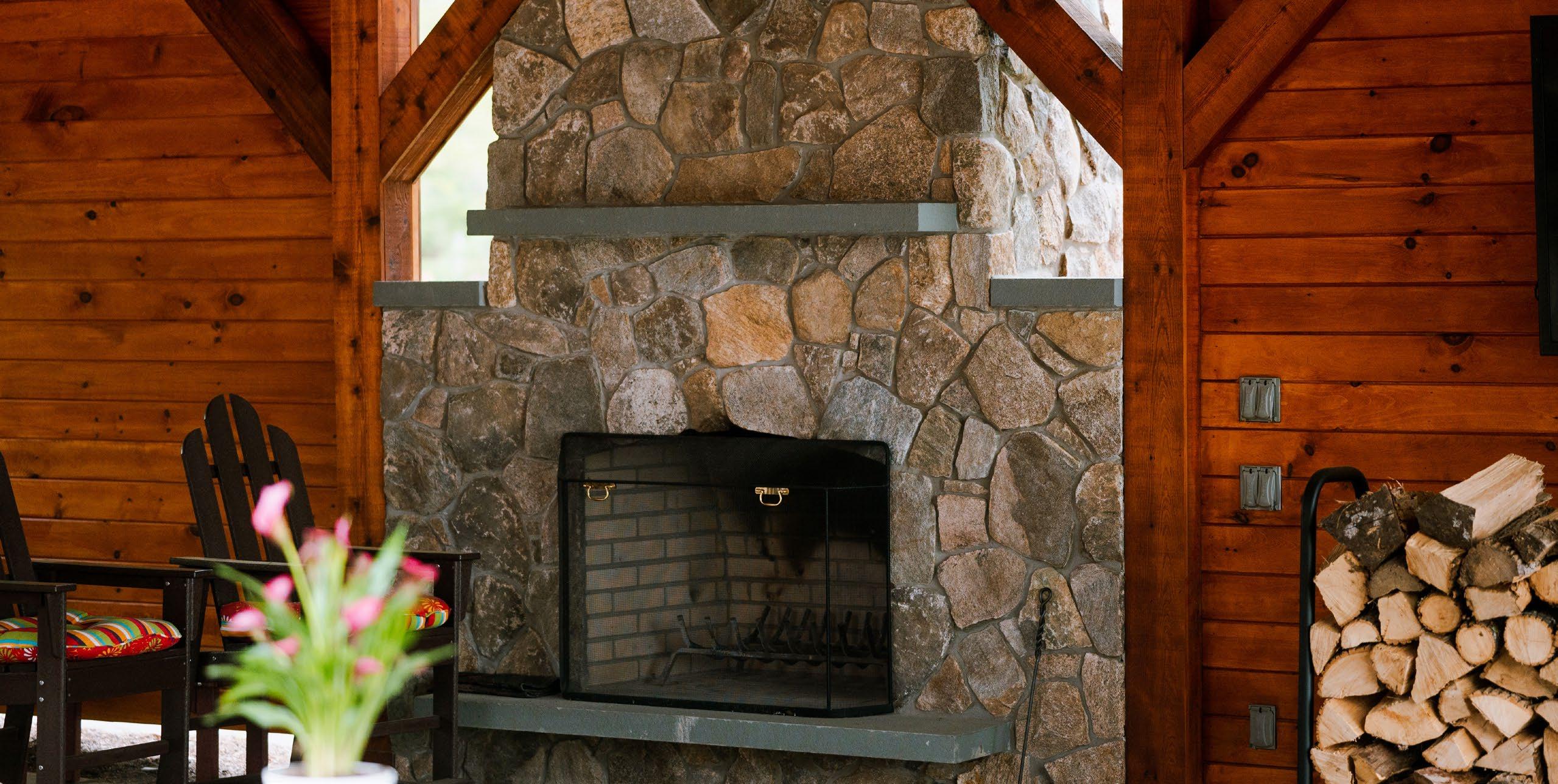
Oakland Marine & Equipment Inc.

206 West Oakland Ave.
Oakland, NJ 07436
Call for Sale Prices - 201-337-7741
All Quantities sold by the Case, Pallet or Drum


• Designed to keep high-performance, low-emission engines clean and operating at peak efficiency

• Protects against excessive viscosity decrease at high temperatures
• Formulated with metal-adhering zinc additives that help protect against excessive wear under high temperatures
• Includes additives with anti-shear agents, which help prevent the breakdown of oil molecules under extreme use and temperatures
• Contains anti-foaming additives for safe use in engines with hydraulic lifters
• Keeps the engine lubricated by controlling and cooling engine temperature
• ISO-L-EGD and JASO FD certified
• Dyed blue for easy identification of mixed oil and fuel
• Developed with a low-smoke formula
• Includes rust and corrosion inhibitors and components for reduced lacquer and varnish buildup
• Provides improved protection against bearing wear and failure as well as ring wear and sticking
• Contains dispersants and detergents to prevent harmful deposits that can cause premature wear, pre-ignition, and port plugging

Horizon Landscape Company of Wyckoff, NJ won an Award of Excellence in the 2022 NJLCA Landscape Achievement Awards for the “Cahill Residence”, designed by Christopher Tanzola, in the Installation without Pool: $25,00050,000 category. Visit www.horizonlandscape.com for more info.


















Monello Landscape Industries of Wayne, NJ won an Award of Excellence in the 2022 NJLCA Landscape Achievement Awards for the “Seaside Luxury Design”, designed by Jarret Bernard, in the Landscape Design Only category.

Farmside also won an Award of Merit. See pages 18-23. Visit www. monellolandscape.com for more info.


Project: Goldstein Residence
Award: Award of Distinction
Company: Tode Landscape Contractors
Company Location: Oakland, NJ
Site Supervisor: Alan Hamann
Project: Carriero Residence
Award: Award of Merit
Company: Vander Sluys Landscape Development
Company Location: Wyckoff, NJ
Site Supervisor: Justin Vander Sluys
LANDSCAPE INSTALLATION: LIGHTING
Project: Fox Project
Award: Award of Distinction
Company: Tode Landscape Contractors
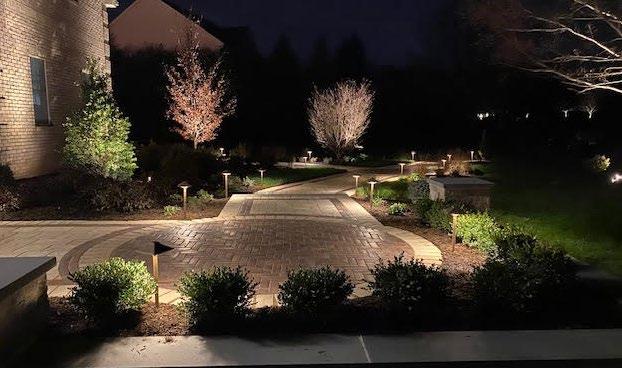
Company Location: Oakland, NJ

LANDSCAPE INSTALLATION: LIGHTING
Project: Navazio Lighting Project
Award: Award of Merit
Company: Greenleaf Lawn and Landscape


Company Location: Pennington, NJ
Designer: Russell Klockner
LANDSCAPE INSTALLATION WITHOUT POOL: UP TO $25,000
Project: Ciongoli Landscape
Award: Award of Merit
Company: Limone Farm & Gardens
Company Location: Haledon, NJ
Designer: Andre Limone
LANDSCAPE INSTALLATION WITHOUT POOL: $25,000 - 50,000
Project: Riverhouse 11 Grilling Station

Award: Award of Distinction
Company: Canete
Landscape
Company Location: Wayne, NJ
Designer: Dave DaCosta
LANDSCAPE INSTALLATION WITHOUT POOL: $25,000 - 50,000
Project: Ram Reshma
Project
Award: Award of Merit
Company: Limone
Farm & Gardens
Company Location: North Haledon, NJ
Designer: Andre Limone
LANDSCAPE INSTALLATION WITHOUT POOL: $50,000 - 100,000
Project: Mt. Bethel Project
Award: Award of Distinction
Company: Blue Mountain Landscaping


Company Location: Bridgewater, NJ
Designers: Felix & Jeffrey Escobar
Project: Natural Stone
Fire Pit Built into Rock

Ledge
Award: Award of Merit
Company: Monello
Landscape Industries
Company Location: Wayne, NJ
Designer: The Monello Team
LANDSCAPE INSTALLATION WITHOUT POOL: OVER $100,000
Project: Lakefront Family Paradise

Award: Award of Distinction
Company: Farmside
Landscape Design
Company Location: Sussex, NJ
Designer: Miles Kuperus, Jr.
Project: Allendale Residence
Award: Award of Merit
Company: DiTomaso
Landscape Group
Company Location: Oakland, NJ
Designer: Len DiTomaso
LANDSCAPE INSTALLATION WITH POOL: $250,000 - 500,000
Project: Salamone Project
Award: Award of Distinction
Company: Tode
Landscape Contractors

Company Location: Oakland, NJ


LANDSCAPE INSTALLATION WITH POOL: $250,000 - 500,000
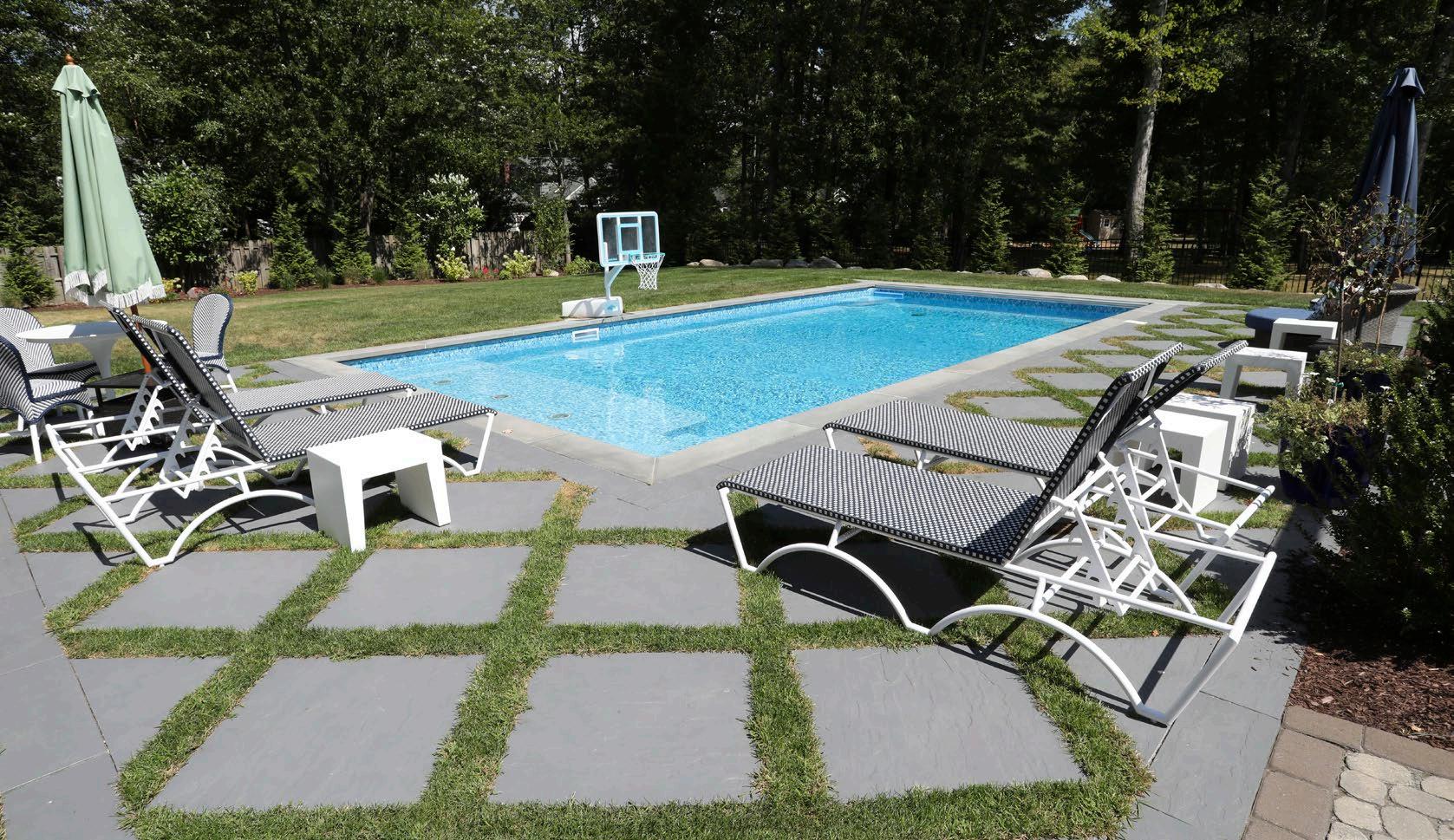
Project: MarcheseFlorham Park
Award: Award of Merit
Company: Sponzilli
Landscape Group
Company Location: Fairfield, NJ
Designers: Andrew Lastella & Jason Sponzilli
LANDSCAPE INSTALLATION WITH POOL: OVER $500,000
Project: Black Point Residence
Award: Award of Distinction
Company: Siciliano
Landscape Company

Company Location: Red Bank, NJ
Designer: Alan Tufts

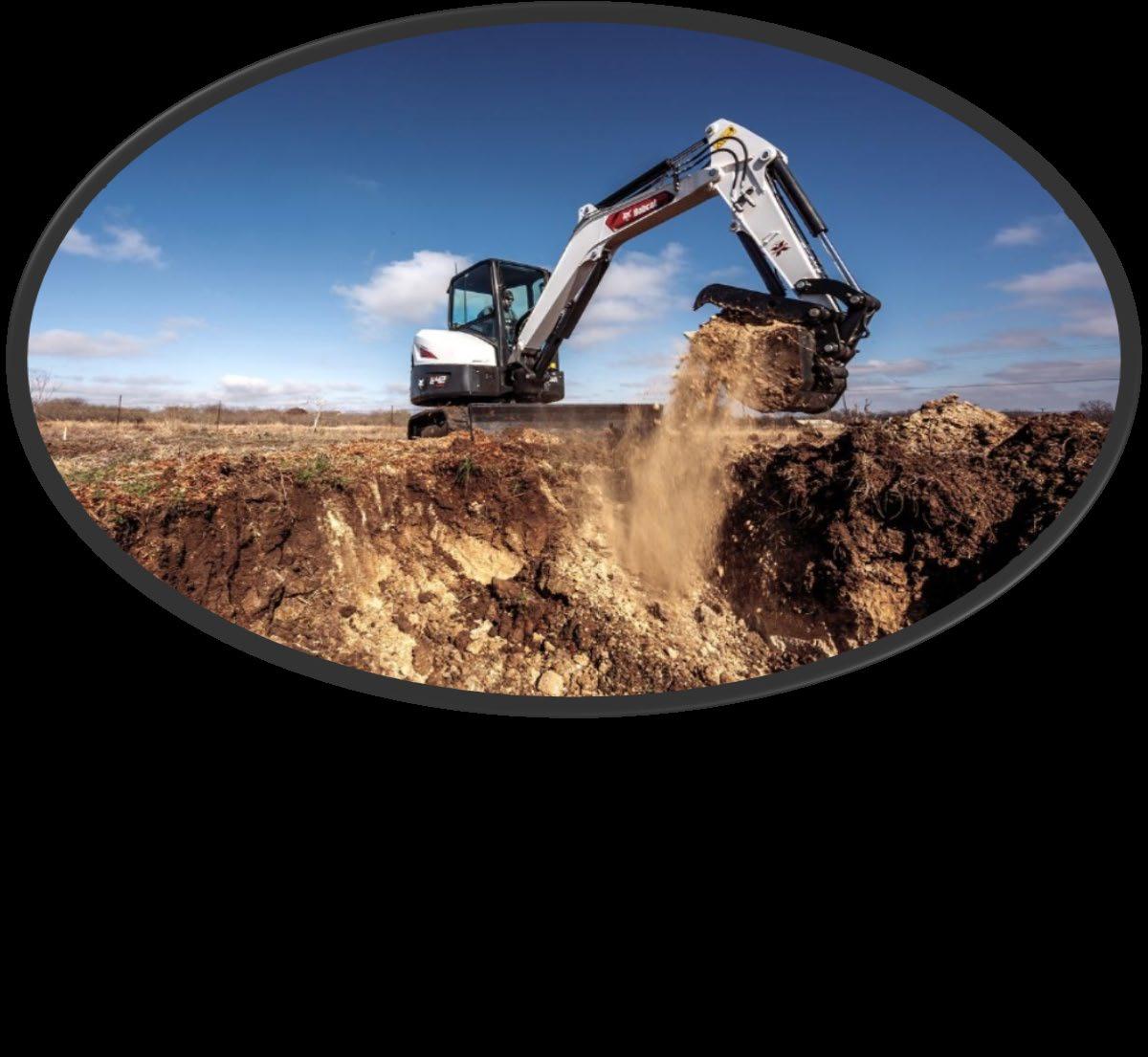





Since our last snow fall; I have noticed something as I drive around, 20% of all properties did not have a proper fall leaf clean up. In my own neighborhood, I had my crews clean my entire cul-de-sac off except for the two nasty people at the top of the block. I’m like an elephant, I forgive but I don’t forget.
I have received calls from a handful of stray customers saying I needed to come back. We were out until the December 15th snow. When I go to the properties, inevitably someone in the neighborhood
by Greg Carpenter, CLT, American Beauty Landscapedidn’t clean up their leaves. I see a growing trend in high value neighborhoods. Young people who don’t seem focused on curb appeal.
I think we need to petition towns to enforce regulations that we currently have. My borough has a height restriction of 10+ inches really 10” - 12”. How about 6” and as far as leaves go, it’s far less clear as to if you have to clean up your leaves or not. Unsightly conditions, hazards or unsanitary conditions 339-12B 1,2, 3 or causing a blighting on the neighborhood are line items stated in the ordinance.
I think by the time we get to blight, these homeowners have made a mess for all their neighbors. And if you are in the path of a prevailing wind, you will be the one cleaning up again and again.

So going into Spring, what do we have to look forward to? Although we had a nice break in February, the snow finally came and pushed
our March 1 start dates of the last three years until two weeks later.
My spring letter advises customers that spring lawn applications will take place the last week of April. If you are lucky, Mother’s Day annuals will be Memorial Day annuals this year.
And I may use this column to inform my wife we’re not going anywhere fun until Labor Day (but have you seen the cost of airfare lately?). Sorry.
Good Luck and Keep Growing!
Greg Carpenter, CLT is owner of American Beauty Landscape since 1982. He attended the SUNY Farmingdale Turfgrass Program and is the Vice President of the NJLCA. Greg also serves on the Rutgers Turfgrass Advisory Board and the Bergen Community College Horticultural Advisory Board.

On Thursday, March 23rd, NJLCA had the opportunity to host students from Bergen Community College’s Landscape Marketing and Sales class to discuss career opportunities in the landscape and outdoor living industry, marketing and best practices in sales.

Gail Woolcott, Executive Director and Maria Albuquerque spent time with Dr. Fischer’s class and discussed the ways that NJLCA markets to members, vendors and the public and how they work with contractors and provide education to help them with their marketing.
Also discussed were the different types of advertising options including social media, print, digital that NJLCA partakes in and the effectiveness of each.
Thank you to Dr. Fischer for joining us at the NJLCA. It was exciting to see so many young people interested in the outdoor living industry!


You can’t work if you’re recovering from an injury. Unsafe work can lead to rework, insurance liabilities, and a poor reputation among other contractors or even customers. Fortunately, safety training can help prevent accidents, keeping your budgets predictable and profitable.
Working hard is important, but working safely should be priority number one. Onboarding and on-the-job training systems can save your crews from hurting themselves and will save you money. When you lose an injured crew member, you risk pushing back project timelines and damaging team morale.
Safe work starts by establishing proper habits when working with landscaping tools and equipment. Demonstrate how to efficiently use equipment without using unsafe shortcuts. Accountability starts at the top, and you should go the extra mile by explaining how to use your tools safely.
The best educators know that there isn’t one way to learn, and having a diverse mix of training can set up every crew member for success.
Landscapers often learn through onthe-job training, but there are obstacles like availability, teaching ability, and training speed. To broaden your options and increase flexibility, leverage on demand video training to fill knowledge gaps and save your team time.
Developing a solid crew can create a collaborative and safe environment for every landscaping job. Morning huddles are a great time and place to introduce new organizational ideas or share safety and efficiency tips picked up on the job. Tailgate Talks are also 10–15-minute sessions with your crews to highlight and promote safe work moving forward.
Greenius, the leading on-demand video training platform for landscapers, has a library of Tailgate Talks you can download and adopt into your weekly routine. These safety checklists open important conversations that help maintain a strong culture of safety.
No matter the industry, training should never stop. Robust training processes can help you grow crew members into crew leaders. Even veteran crew leaders or foremen stand to benefit from additional leadership training or even skill refreshes.
Leverage

Manually building training programs can be challenging and time-consuming. Leverage an on-demand training platform, like Greenius, to streamline processes. Greenius houses online training courses built for landscapers in English and Spanish, making it easier to onboard, train new employees, and manage ongoing safety training.
NJLCA has partnered with Greenius and LMN to provide you with member discounts on both products. Check out pages 29 and 42 for more information.
To learn more, visit share.golmn.com/ NJLCA or schedule a meeting with a solutions expert. Greenius is an online training tool and Learning Management System (LMS) for Landscape workers for equipment operation. The company uses live-action videos, online exams, and an app-based Field Checklist. Greenius also incorporates an employee lifecycle tool with performance review capabilities.


AdamsN@HelenaAgri.com
GerzabekT@HelenaAgri.com

Build a team of rockstars, make more profit, and remove the frustrations of operating a landscape business. LMN is recognized as North America’s#1 business management, and learning solution software for landscape and snow removal professionals.

Our customers have created:
Over $51 billion dollars worth ofestimates 78+ million individual employeeclock-inscaptured
Budgeting
Grow your landscape company with the right blend of skilled labor and equipment and make a profit on every job.

Customer Management
Elevate customer and workflow management, get approvals faster and create transparency.
Estimating
Build profitable estimates faster.
Scheduling and Time Sheets
Manage your schedule, track time quickly and accurately, and simplify payroll.
Invoicing
Automated invoicing from timesheet data.
Job Costing
Increase profits, estimate accurately and eliminate spreadsheets.
245,000 Green and Snow employeesmanageddailyon LMN

Companies who use LMN realize10-15+%inadditional annualrevenuegrowth
On the purchase of LMN's Pro+ Business Management Software, member receives 25% off Professional Implementation ($211 savings) +
FREE 2 months LMN Business Management Software ($788 savings) +
FREE Unlimited users for 2 months ($400+ value)

Total Association Member Savings: $1,399

“Wish I would have had LMN when we started 17 years ago! I tell every single landscaper I know about LMN. It completely changed our business! If every single landscaper used it, then it would be better for the entire Industry.”

Innovated by Performance Trailers, Flanders NJ 1996-2023
Floor framed on 24” centers was the standard. 12” on center crossmembers for a much stronger frame
Trailer tongue 36” long , too short to be towed by a wide vehicle
Trailer tongue 60” long to minimize chance of contact between tow vehicle and front of trailer
Trailer ball coupler welded in place with 2-5/16” ballChannel bracket welded on trailer with bolt on coupler to allow height adjustment, and bolted on for easy, fast replacement in case it is damaged
All trailer ramps had a flap at the ground, they often broke, and the user had to bend over to flip.
Equipment racks individually attached screwed to walls, not repostionable, often came loose.
Triple taper ramp door is tapered on the bottom, to go flat to the ground. Top or ramp is tapered and plated steel .
SnapRack E-Track based equipment racks, E-track is securely fastened to walls, racks snap in and out securely.
Roof is solid, galvanized steel or aluminum Roof is translucent fiberglass, longer lifespan, durable, illuminates trailer in daylight like on a UPS truck
What is next? Ask us and we’ll design it!Get it built the way you want it at Performance Trailers!
Just a few comments from our Google Reviews page:
“Thank you for your extensive answers and solutions. That is a great help and I appreciate you taking your time to let me know the solution and your advice -that is why I continue using you as my trailer vendor.”
“Great place for all things trailers. Awesome selection and have all the right pieces and parts to make it your own. Also have a full service shop with some great techs. From service, parts, to sales overall great business to deal with, been a customer for over 15 years. Skip the online places and head over or give them a call to discuss what you need..”

• Leaf spring axles standard , Torflex Axles Optional
• Our US Patented Triple Tapered Fast Load Ramp, no flap, heavy duty ramp rated for 4500# with spring assist
• 36” side door w/step, or option for no step.
• 3/4” plywood kick plate at bottom of sidewalls
• 2 sidewall scoop vents
• Translucent Fiberglass roof, lets in a lot of light. Proven durable – check a UPS Truck – 1 piece aluminum roof available for those who prefer it.
• Floors are 3/4” treated plywood framed 12” on centers
• (2) 12-volt LED interior dome lights,
• 60” triple tube tongue w/adjustable 2-5/16” coupler or pintle ring
“Everyone that I dealt with was really nice and genuine. They don’t play games, and are strait forward with their price. I am happy I found this place for my trailer. Definitely giving this place more business in the future!”
• Aluminum diamond plate stone guard 2 ft high on front
• LED exterior lights, marker and taillights
• 4 wheel electric brakes. Ziebart undercoating.on frame
• Cable tension bracket to keep ramp door cables from jumping off pulleys
• Locking hasps set (2) on rear ramp. Keyed alike, standard padlock style hasps available
• 60” triple tube extended tongue with longer center tube frame for a stronger tongue
• 2 LED strobe flasher safety lights on rear door header, with a rear switch
• Loading /Backup light on rear door header.
It has been said that for most people there are about 10 moments that change the course of their lives. “I believe that in a product’s evolution there are about 10 things that get changed to set it apart.” Glenn Ehrgott, Performance Trailers Inc. Call us today to learn how we build a better trailer helping you build your business. We listen to your needs and personally respond with innovative, quality solutions.




Over 30 years of re-inventing and improving the trailer industry Performance Trailers Inc. was awarded the NJLCA Innovation Award in 2022 for contributions to landscape trailer design encompassing four patents, thousands of trailers sold and serviced, and satisfied loyal clients.




 by Steven K. Rettke, Rutgers Cooperative Extension
by Steven K. Rettke, Rutgers Cooperative Extension
Many landscapers are familiar with the larger beneficial insects such as lady beetles, praying mantids, lacewings, and flower flies. Although common, parasitic wasps/flies (parasitoids) are examples of landscape beneficials that are typically less recognized because of their small size, and that magnification is needed for best viewing. Also many parasitoids feed unseen on the interior organs within their hosts. Although the majority of parasitoids are found in the two orders mentioned above (Hymenoptera & Diptera), there are more than 50 families that have been identified. Many of these insects do not have distinctive differences in general appearance & therefore attempting to ID the specific species or even family is not practicable for the landscaper or nursery grower. Learning about & being aware of the activity of these less observed but exceptionally important biological control organisms are photographed & reviewed in this article.

Within the landscape, beneficial parasitic wasps or flies are called “parasitoids.” These parasites will cause the death of their hosts. Within the landscape, approximately 2/3rds are wasp species while 1/3rd are fly species. Unfortunately, parasitoids are often under-appreciated, since they can provide even better biological control than the larger predators. In many situations, parasitoids will give superior suppression of pests because they: (1) are more host-specific; (2) have a better searching ability; (3) work at lower pest densities; (4) require less food to complete development; (5) are better synchronized to their hosts’ life cycle, and (6) eliminate the hazards of host-seeking since eggs are laid in or on the host.

Since parasitoid adults are usually significantly smaller and less stationary than many of our well-known landscape predators, they often go undetected by landscapers. Since parasitoid larvae often develop inside the host, it is difficult to monitor for and appraise their impact on a pest population. Monitoring for adults within the landscape may not be practical, although yellow sticky traps can be attempted. More effective field evaluations can be made by observing host symptoms such as the swelling of aphids into mummies, the darkening of soft scale insects, and the exit holes in armored scale insect waxy covers & exoskeletons of soft scales.
More than two dozen Black Bean aphids are present on the undersides of this leaf. At least four presently show evidence of having been parasitised by wasp parasitoids, but others will undoubtedly soon follow. The swollen, gray colored appearance is a good indicator that these aphid pests are no longer viable. (Photo Credit: Steven K. Rettke, Rutgers Coop. Ext.)
A closer look at the parasitised Mellon aphids with a clear view of the smooth edged exit holes the adult wasps were required to make to escape from the carcass of the aphid. (Photo Credit: Steven K. Rettke, Rutgers Coop. Ext.)

A parasitoid wasp within the genus Aphytis is often stated to be one of the most valuable for landscapers. Not only does the female lay eggs on scale pests for the wasp larvae to consume, it also performs host feeding. The female wasp wounds the armored scale by using her ovipositor to pierce through the waxy cover. While the scale bleeds to death, the wasps consumes the emerging blood. (Photo Credit: Maryland Coop. Ext.)
APHIDS: Aphids are the hosts of many biological control organisms including wasp parasitoids. An egg laid by the female wasp hatches inside the aphid with the larva consuming the internal structures of the host. Aphids containing parasitoids will typically become brown, swollen, and have a circular hole cut out of a hollowed body (these host symptoms are given the name “aphid mummies”). “Mummies” remain attached to stems and leaves for an extended period. Insecticide sprays can be avoided if many mummies are observed. If sprays are considered necessary, then soaps or oils or non-broad-spectrum insecticides can reduce detrimental impacts upon the parasitoids which are highly sensitive to many chemical sprays.
All of the parasitised aphids on this leaf show the classic grey colored “mummies” appearance. The wasps pupate inside the empty carcass of each aphid & then emerged as adults after cutting out exit holes. (Photo Credit: Steven K. Rettke, Rutgers Coop. Ext.)



It should be noted that specific pest and prey ratios needed to achieve satisfactory suppressions have been established for some pests, but many have not yet been determined through research. When beneficials are present, decisions to double the action thresholds for our key landscape pests have been recommended. Some biological control interactions are better understood than others, but it is a limitation to good field decisionmaking when evaluating the impact of beneficials.
An even closer look (140x) at the parasitised aphid “mummies” having the cut-out exit holes & removed flaps created by the adult parasitoid wasps. Adjacent to each “mummy” are white aphid exoskeletons or cast skins. (Photo Credit: Steven K. Rettke, Rutgers Coop. Ext.)
SCALES: It is understood that wasp parasitoids can provide the most effective biological controls for reducing scale pest populations. Research has shown this to be particularly true for the suppression of armored scale insects. The larvae of parasitoids feed on the adult scales beneath their protective waxy cover. It is impractical in the field to monitor the level of suppression by turning over the covers and examining individual insects with a hand lens. A more effective method is to observe characteristic circular holes in the scale covers that are created by emerging adult wasps. There is usually only one exit hole with each armored scale, but there may be several holes with each soft scale.

If irregular tears are noticed in scale covers, then lady beetle predators were present. If holes have jagged edges, then possibly hyper-parasites were active.
promised, especially when poorly timed sprays are applied. All too often, improperly applied insecticides destroy beneficial parasitoids, have a limited impact on the scale populations, and may cause scale pest populations to increase.
between 1 to 3 generations per year). This control strategy allows parasitoids to maintain effectiveness. This alternate strategy is different than the more common recommendation that focuses on insecticides primarily being applied when scale crawlers emerge. However, both strategies can be successful.
These juniper scales show evidence of parasitoids wasp activity. With armored scales, there will usually be only a single exit hole per wax cover. The removed cover shows the partially consumed body of the actual scale insect. (Photo Credit: Steven K. Rettke, Rutgers Coop. Ext.)


An even closer look (100x) of juniper scales with most having exit holes from emerged adult wasp parasitoids. The edges of a couple of the exit holes appear jagged, possibly indicating the presence of hyper-parasites. (Photo Credit: Steven K. Rettke, Rutgers Coop. Ext.)
The handful of calico scales show evidence of parasitoids with extensive exit holes within their exoskeletons. They are classified as soft scales & do not produce separate waxy covers as do the armored scales. Also unlike armored scales, there may be more than one exit hole per scale. Some of the individual scales shown above have 5 or 6 exit holes. (Photo Credit: Steven K. Rettke, Rutgers Coop. Ext.)
When inspecting scale infestations, if many scale covers are seen having circular exit holes, then it is recommended that insecticide sprays not be made. The conservative use of control sprays is especially suggested if scale population densities are low, and no plant symptoms are evident. Numerous studies have indicated that the random or non-timed spraying of various broad-spectrum insecticides against armored scale populations in the field is often counterproductive. Often scale populations can be successfully suppressed by wasp parasitoids, but this ability is com-

To help reduce the destruction of beneficial parasitoids, the use of control sprays should be applied when plant damage symptoms are above aesthetic thresholds and beneficial populations are low. When warranted, a 3% horticultural oil spray is suggested during the late winter dormant season. However, do not expect this application to completely solve the scale problem. Additional 1-2% horticultural oil treatments should be applied when flying adult male scales emerge. Another summer oil spray should then be applied after crawler activity has ended. Therefore, two well-timed oil sprays are applied to each generation of scale insect (various armored scale species have
University of Maryland research study showed the detrimental impacts the use of broad spectrum insecticides had on Chalcid wasp parasitoids in the landscape. Results showed over a 4 week period of time, that the broad spectrum insecticides reduced Chalcid wasps between 50-90% compared to the effects from 2% horticultural oil treatments. (Graph Credit: University of Maryland Research)

Additional Parasitoid Examples:
A series of photographic examples show parasitoids that have successfully attacked the larva, eggs, and pupa of different caterpillar pests often encountered in the landscape.

University of Maryland research study indicated that armored scales will increase at a landscape site overtime when broad spectrum cover sprays are applied. When cover sprays had a duration of more than 4 years then scale populations increased 3-4 times above the levels compared to sites where cover sprays were applied less than 4 years or not at all. (Graph

Credit: University of Maryland Research)
1a-The tobacco hornworm ( Manduca sexta) & tomato hornworm (Manduca quinquemaculata), are significant pests that many gardeners are familiar with. A small braconid wasp, Cotesia congregatus is one of the most common parasitoids found parasitising this caterpillar. The wasp larvae feed inside the body digesting the interior structures. The photo shows white cocoons protruding from the body of the tobacco hornworm after wasp larvae emerged to pupate. After adult wasps emerge from the cocoons, they will search for other hornworms to parasitize. This hornworm caterpillar is now a member of the “walking dead.” (Photo Credit: Steven K. Rettke, Rutgers Coop. Ext.)
The photo examples with caption descriptions include: 1-Braconid wasps (Cotesia congregates) that have parasitized a tobacco hornworm caterpillar; 2-Ooencyrthus kuvanae wasps that have parasitized a spongy moth caterpillar egg mass; 3-Tachinid fly species that parasitized a bagworm caterpillar pupa.


1b- As would be expected, because of the large size of the larva, the adult moth of this apparent tomato hornworm is also exceptionally large. The wingspan of extended wings can reach 5 inches. These robust moths are remarkably agile flyers. They have the ability to hover like hummingbirds. The parasitised larva shown in the first photograph above would not have successfully pupated & reached this adult stage. (Photo

Credit: Steven K. Rettke, Rutgers Coop. Ext.)
2b-The small, round holes evenly distributed within this spongy moth egg mass were created by the adult parasitoid wasps as they emerged. The spongy moth eggs are laid in multiple layers within the mass. These tiny wasps have short ovipositors & can only reach & lay eggs in the upper layers of the mass. Therefore, no more than 20-30% of the spongy moth eggs within a mass can be successfully parasitised. (Photo Credit: Steven K. Rettke, Rutgers Coop. Ext.)
3b-Tachinid fly adult emergence hole in the body of the incomplete development of the pupal stage of a bagworm caterpillar. The presence of this parasitoid fly would have remained hidden & undetected without the opening-up of the protective bagworm sack. (Photo Credit: Steven K. Rettke, Rutgers Coop. Ext.)

2a-A tiny parasitoid wasp of spongy moth (previously called gypsy moth) egg masses is Ooencyrtus kuvanae. This specialized wasp parasitoid was introduced into the United States many decades ago & can have 3 generations per year. The adult wasp inserts an egg into the egg of a spongy moth. The average size spongy moth egg mass contains between 400 to 600 eggs.

Steven Rettke has been employed by Rutgers Cooperative Extension since 1996. His primary responsibilities include
3a-Tachinid flies within the family Tachinidae are the most important group of parasitoid flies. Various species will attack the larval stages of some of our landscape caterpillar pests. The above photo shows the recent pupal emergence of an adult male bagworm moth (black moth to the right of center). At the upper left corner of photo is a Tachinid fly laying an egg within the bagworm still in the larval or pupal stage. (Photo Credit: Steven K. Rettke, Rutgers Coop. Ext.)
promoting the IPM (Integrated Pest Management) Philosophy to professionals working within the landscape, turf, nursery, & greenhouse industries. His areas of expertise include the key insect & disease pests of ornamental plants/crops. Each season, for 26 years, he has traveled extensively throughout New Jersey providing pest monitoring & consulting information to selected nursery/greenhouse growers
& commercial landscape/turf managers participating in the Rutgers Greenhouse, Nursery, & Landscape IPM Programs. During his career with Rutgers, he has delivered more than 850 presentations within the areas of Integrated Pest Management.
Reference: Syllabus of the 1997 Advanced Landscape Plant IPM Short Course, Volume III; John Davidson, Dept. of Entomology, Univ. of Maryland
This Holiday season has seen an increase in E-Commerce and with it, CyberCriminals are seizing the opportunity to “get in on the action”$$! They want to Lockup your computer and hold it for ransom; Trick and deceive you to give them your valuable information that they can monetize; make you believe that they are your friend, family, neighbors, business associates, someone you know, someone you want to know, someone you should know and then have you give them your valuables, confidential information and money!
The Internet Crime Complaint Center of the FBI (IC3) averages 440,000 reported complaints of cybercrime per year—and the number of unreported crimes is higher. In 2020 the number of complaints to IC3 shot up to an astounding 791,790, with victim-reported losses totaling $4.2 billion. These are only the “reported” numbers.
“Small business” is the top target of CyberCriminals. As of 2022, there are 33.2 million small businesses in the US which account for 99.9% of all US businesses. Small businesses account for 46.4% of jobs in the US AND 43.5% of the US Gross Domestic Product(GDP). That is a BIG Target!

• Look for misspelled words and poor grammar. E-mails from legitimate businesses should look professional and they will have been spellchecked before sending. Spelling and grammatical errors are warning signs of a bogus e-mail.
• Do not respond to scare tactics. A common phishing tactic is to warn you that “your account will be closed,” “your account has been compromised,” or “we have been
urgently trying to contact you.”
• Be wary of e-mails advising “information about your order” or “we are trying to deliver your package.” It’s not uncommon for these e-mails to appear to come from FedEx or Amazon. If you are concerned about a legitimate order, you can check your order status directly with the source or verify status with a tracking code provided by the (real) vendor.
• When in doubt, call the sender first to verify that the e-mail is legitimate. It may seem strange that your boss is sending you an e-mail with the subject line “this is cool” or “great weight loss program,”—but it is from your boss. . . or is it? (Mother? Father? Family member? Business associate? Friend?) When in doubt… Delete and CALL!
• Don’t click on links that you don’t recognize. Try hovering your cursor over the URL—if the actual hyperlink address is different than the address provided—it’s a scam.
• Double-check the sender’s address. On first look, it may look like a legitimate address—but on closer inspection you may notice that it is spelled slightly different or appears “off” in some way. Some e-mail programs also enable the receiver to hover the cursor over an e-mail sender’s information and will show the real sender’s address. For example, you may hover over “mom@gmail” and see an unrecognizable address. Remember, however, if mom’s e-mail has been spoofed, the address may appear legitimate.
• Do not respond to e-mails that ask you to update your password,
account number, or personal information. These e-mails may appear to be from your bank, e-Bay, PayPal, or even the IRS. Legitimate businesses should never request that confidential information be sent or “updated” in an e-mail—and any links to the “bank” included in the e-mail are most likely fake.
• Don’t open e-mails that purport to be from a business but come from a web-based free e-mail account. For example, Amazon customer service will not send an e-mail from: amazoncustomerservice@gmail.com.
• If it sounds too good to be true— avoid it! Unfortunately, you probably don’t have a distant rich relative that left you millions, you didn’t win the Costa Rican lottery (did you even buy a ticket?), and the king of a tiny country is not trying to give you money.
Unfortunately we will all be targeted by CyberCriminals multiple times on our Cell Phones, Email, Computers, VOIP Phones, & Laptops. We therefore strongly recommend all businesses to purchase Cyber Insurance. Cyber Insurance companies offer immediate advise, forensic specialists, governmental regulation compliance, payment of fees, penalties, repair costs, lawsuits and more.
In 1979 Richard Gaynor joined Middleton & Company Insurance Agency after graduating The College of New Jersey/Trenton State, creating and marketing a variety of specialized insurance programs. Richard joined the Boards of many industry Associations. He attended most meetings and acquired a keen understanding of the protection needs and issues that each association faced. Richard assumed the presidency of Middleton & Company in 1995, continuing the commitment to provide business solutions to clients while maintaining strong profitable growth.
Native plants are a good way to incorporate sustainable vegetation into yards for clients who are environmentally minded. Native plants are adapted to local climate and soil conditions, requiring less water, fertilizers, and pesticides than non-native vegetation. For landscapers who have property owners looking for native alternatives to non-native vegetation, below is an option to meet your clients’ needs.

Christmas fern (Polystichum acrostichoides) is a hardy, evergreen fern that
can grow up to 2 feet high but does not spread very far (only 1 - 2 feet) (Photo 1). It gets its name from its leathery, green fronds which remain vibrant through the holiday season. Christmas ferns are a great way to add winter interest to a garden. Christmas fern grows in clumps, with the clumps growing larger as the plant matures. Because of this, it makes a good groundcover if many are densely planted or as an evergreen border for a garden.

Christmas fern does best in cool, moist, well-drained soils and can tolerate some shade to heavily shaded areas. It does not do well in clay soils, standing water, or in full sun. Christmas fern also prefers acidic to slightly acidic soils (pH <6.8). It is quite easy to establish and grow in the right conditions.
Christmas fern is considered a highly deer resistant plant as it is rarely damaged by deer browsing. It makes a good ornamental plant for areas that have large deer populations, whose browsing affects how successfully other plants grow. It also grows well in woodland gardens, adjacent to water features, and at the base of shade trees. As a fern that reproduces by spores, and not berries or fruits, it is not a good option for attracting or feeding wildlife. Christmas fern is an excellent choice to replace many nonnative ferns, such as Japanese netvein hollyfern (Cyrtomium falcatum), and nonnative ground cover plants such as any variety of hostas (Hosta species).
You can find nurseries in New Jersey that sell native plants by visiting the JerseyFriendly Yards website at http://www. jerseyyards.org/jersey-friendly-plants/ where-to-buy-native-plants/.
Steven Yergeau, Ph.D. is the Dept. Head and Agricultural Agent for Rutgers Co-operative Extension of Ocean County. He is also Assistant Professor for Ocean & Atlantic Counties. For more info visit http://ocean.njaes.rutgers.edu.

Ask any business owner to identify his/her primary human resources problem and you will instantaneously hear “recruitment,” “staffing,” “finding people,” etc. With a paradoxical national economy characterized by damaging inflation, slow growth, and a low unemployment rate, that problem will likely remain for a while. Case in point, a business owner from Ohio called me the other day to say: “Steve, staffing has changed quite a bit over the past couple of years. Years ago, I desperately needed to find a successful Salesperson to bring in more work. Nowadays, I would gladly trade that Salesperson for three Landscape Laborers to help me complete the work I already have in the pipeline.”
That common refrain is echoed coastto-coast from Middlesex to Malibu, with no likelihood of cessation. Lamentably, business owners have become increasingly inured by the lack of labor, almost now accepting that condition as the “new normal.” For the good of their companies, and the green industry, I sincerely hope that is not the case.
Business owners have not adapted creatively to this ongoing dearth of qualified applicants. Unlike their traditionally-earnest approach to sales, customer service, or gross margin metrics, landscapers have lacked the
same degree of vigilance when it comes to employment staffing. For example, most landscape companies do not have formal staffing goals, lacking even basic empirical metrics, with no real followup at the monthly financial/operations review meetings. Do you think that same lack of precision, attention, and concern would happen for company revenue?
Also, many such companies cannot answer the fundamental question “Who owns staffing in the company?” Is it the Department Managers, Human Resources, Field Supervisors? Many companies don’t know the answer, since they haven’t considered even asking that fundamental question. Now, about all those leadership books you have read, leadership seminars you attended, and TedTalks on leadership you watched? Crickets.
By way of derivation, business owners constantly bemoan the increased cost of labor to acquire new employees, and to maintain existing staff levels, though they rarely have an integrated plan to increase revenue and gross margin dollars by increasing sales goals, improving production rates, improving gross margins across individual revenue streams, applying bonus programs to self-fund pay raises due to increased enhancements approvals, improved job estimates, achieving job retention
goals, and attaining greater revenue per employee indices. It all has to fit together as a system, for it to work effectively.
Within those company-wide concerns, business owners must shift their resolution strategies away from the traditional singular recruitment focus to a more comprehensive and simultaneous approach incorporating internal, external and technological initiatives.
1. Internal. Internal recruitment methods remain the most effective tactic in securing new employees. While hiring a full-time recruiter is obviously preferred, despite their complaints about labor shortages, most companies have not yet chosen that option. In-house recruiters should receive base pay compensation, as well as placement pay for each new hire brought into the company, and a bonus for ensuring that monthly staffing goals are consistently maintained.
Most companies have an underperforming employee referral program. Typically, (1) these companies do not offer a lucrative incentive to motivate employees to recruit new candidates; (2) no specific company manager is accountable for this program; and (3) executives offer

only rhetorical support in place of actual capitalistic value (e.g., increased employee pay, better training, improving the company culture) to lure applicants into the company.
In general, at the current time, successful employee referral programs offer employees an average bonus of $850 for each new Landscape Maintenance Foreman brought into the company. Realizing that employee retention, not recruitment, is the ultimate goal, astute companies divide the referral bonus payout across three timeframes: $100 at the date of hire, $200 after the employee has been on the job for 90 days, and the remaining $550 after six months of employment. Within the context of business acumen, if the employees are not providing a steady flow of applicants each week, the bonus amount is clearly insufficient, in much the same way a sales commission plan or enhancement bonus plan would similarly fail.
2. External. Building upon internal recruitment efforts, companies must also broaden their scope to incorporate vendors, agencies, and customers to attract candidates. Stimulated by consistent executive and managerial contact, external sources should be contacted regularly on a bi-weekly basis, provided with recruitment materials (e.g., job descriptions, job applications, career ladder, training program), and rewarded with gift cards, additional business, discounts, public recognition, and on-site partnership appreciation events. In much the same way that marketing efforts precede sales, external recruitment partners contribute to overall staffing success.
Companies must also consider the use of an external contract recruiter or an independent contractor (i.e., 1099) to accelerate recruitment efforts. These individuals are paid exclusively on a headcount-add basis, with a backloaded bonus for satisfying new-hire retention thresholds (e.g., 90 days, six months, a full landscape season).
3. Technological. Companies must supplement their internal and external recruitment efforts with constant

technological impact. Whether it is a weekly refresh of the company web-site, a bi-lingual option home page, semi-weekly social media posts (e.g., Facebook, Twitter, Instagram, LinkedIn), on-line recruitment videos which are quickly becoming the new normal, consistent analytical focus of SEO efforts, actual employee testimonials, and cell phone-friendly recruitment applications, technology must be used more often, with increasing quality, and be managed more rigorously than ever believed.
Unfortunately, many business owners take a detrimentally passive view to technological staffing efforts thinking it will achieve desired goals automatically. That’s not the way it works. Technology is a supplement, not a substitute for staffing accountability. Here again, someone in the company must be responsible for monitoring the social media recruitment campaigns, tracking incoming job applications, measuring the hits or views on certain job site postings, and making follow-up email or phone contact to all interested applicants. Same answer as before: Just like other business goals, someone has to own this function for it to be even minimally effective.
In closing, the costs of recruitment, in both direct and indirect terms, continue to have significant impact on landscape companies. Accordingly, business owners must stop doing what they have been doing, since those singular historical tactics are no longer effective. The strategy from 2018 no longer works; just look at your organizational chart and count the number of current vacancies.
Instead, to address that ongoing problem, it is suggested that business owners begin to view staffing in the same strategic and tactical light as they do with other business goals, and implement an integrated array of initiatives that leverage internal, external, and technological best practices to help them achieve their company staffing goals in a sustainable manner.
If you have any questions or comments about this topic or anything else related to human resources, simply call me at (760) 685-3800.
Steve Cesare has more than 30 years of human resources experience. Currently, Steve is a Principal Consultant with the Harvest Group, a nation-wide firm.
Steve earned his Ph.D. in Industrial/Organizational Psychology from Old Dominion University. He has authored 68 professional journal articles and made over 60 presentations at professional conferences. Additionally, he has 17 years of collegiate teaching experience at Old Dominion University and the University of San Diego.
Steve’s areas of direct value include helping clients with their: human resources programs, legal compliance, performance management processes, compensation systems, training and development, safety and workers’ compensation, and wage and hour issues.

Before we know it, the snow will have melted and spring will be in full swing. Have a strong start to the year with these seven proven marketing tactics.
My first tip is to email your current customer base about the services that they can buy from you this spring.
Contact your customers now with email and let them know what services you offer. This could range from things like spring cleanup, sprinkler turn-ons, and to let them know to contact you NOW to get started for spring and summer installations and construction projects.
Use direct mail with your current customers. At Ramblin Jackson, we use a ton of direct mail. We have a print monthly newsletter that has sales and marketing tips that are fun. We have little games and things that you can do. If you don’t get this and you’d like to, grab our Landscaper’s Marketing Toolbox at landscapersguide. com/toolbox. We’ll mail you a box of beef jerky and our most recent newsletter and get you added to the list so you don’t miss out each month.
Print postcards can be targeted to specific neighborhoods as a way of proactively marketing your business. Be
sure to include specific offers so you can track the effectiveness of the campaigns.

My third tactic is to reactivate lost leads in your pipeline with a SPEAR email. Did you have any potential clients almost hire you last year?
A SPEAR email stands for Short Personal Expecting a Reply. I attribute this idea to Dean Jackman in my full blog post and YouTube Video which I recommend you check out for more details just do a Google search for: Jack Jostes How To Reactivate Lost Landscaping Sales FAST With ONE Simple Email.
It can be a simple email like: Subject: landscaping project Carl, are you thinking of finishing your landscaping this year?
- JackIt almost reads like a text message. Send that SPEAR email to leads in your database -- such as leads who got as far as having an appointment scheduled, but they canceled. Or maybe you got as far as having a proposal sent to them and they totally ghosted and you haven’t heard back from them.
Look through your notes. What were the reasons why? Were they going on vacation? Were they applying for a home equity line of credit? You could follow up and say, “Carl, did you end up closing on your home equity line of credit?” A
by Jack Jostes, Ramblin Jacksonlot of times people will reply, “Yes, I did, and I was just thinking of finishing my landscape and I lost your contact info. I’m glad that you emailed me.” The SPEAR is a great way to reactivate leads who are in your pipeline. They’ve already contacted you, they’ve already expressed interest, they didn’t close for some reason. Reactivate them and you’ll drum up a bunch of sales.
Print door hangers are a great way to market to the neighbors of your clients. So if you’re out even doing things like fall cleanup, sprinkler blowouts, different things like that, assign somebody on your crew who is going to give a print material. Maybe it’s a door hanger or why not repurpose your postcards? Whenever I do postcard campaigns, we always print another 20 to 50 and include them in whatever other marketing we’re doing. They’re just really handy. You can put this under somebody’s windshield wiper blade or tuck it into their door, put it in their mailbox or whatever.
Whenever I’m making content like this video or a graphic for my postcards or a graphic for anything, I’m thinking about, “How can I resize this and publish it on social media?”
Greenius makes it simple and easy to train and develop staff and crews using on-demand training and 360-degree employee reviews whether you’re at the office or in the field.
Over 1.3 MILLION Greenius training courses completed
30,000+ HOURS of training videos consumed
On-demand Employee Training
Deploy an automated training program that ensures your teams get the training they need, when they need. Eliminate jobsite bottlenecks and rework incidents.
Expansive Tailgate Talk Library
Keep your teams focused on the objective and safe on the job site.
Performance Reporting
Better manage your staff with meaningful insights into their training, on-the-job performance and create a culture centered around continuous improvement.
360-Degree Performance Reviews
Pinpoint areas for growth and development while uncovering how you can build a team by using their immediate feedback.
Access Training on Any Android or iOS Mobile Device
Avoid wasted time between job sites.

WE ARE PROUD TO PARTNER WITH
GREENIUS 2023
NJLCA MEMBER

OFFER:
FREE 2-month license of Greenius Training Software ($250 savings) +

FREE Unlimited users 2 months ($200+ savings) +
FREE Unlimited Training Courses +
FREE Custom Implementation ($347 savings)
Total Association Member Savings: $797
GoGreenius.com

Hopefully asking for reviews is as much of a part of your process as is sending invoices. At my company -which has very similar milestones to a landscape company in the sense that we build things, and then maintain them regularly -- we systematically send a request for feedback at a certain milestone during our projects and then at launch, and then I do it quarterly with my clients. With your landscaping clients, you might collect feedback midway through the project, after it launches. For maintenance, I recommend asking every quarter. The key is assigning a person on your team who’s going to ask the client in person like, “Hey, Bob, halfway through the project, I’m going to send you an email requesting feedback. Will you fill that out for me? Cool, Bob, thank you.” Then halfway through the project, “Hey Bob, remember when I told you earlier that I was going to send you an email for feedback? Cool. Hey, I’m going to send
that later, and I’d really appreciate it if you’d fill it out.”
Now Bob has already told you, yes, he’s going to do it. He’s going to be way more likely to follow through than just randomly getting an email asking for it. The key is send something, make it easy.
My last tip is to send gifts to your best clients. Sending a gift in the mail goes a long way with a lot of people. I personally like sending food gifts. Somebody who wrote a book about giftology said that sending food is a bad idea, but I like doing it because I think it’s cool. I enjoy trying different foods and I get positive feedback from my clients that they enjoy receiving those types of gifts..
Jack Jostes is the CEO of Ramblin Jackson, a green industry digital marketing and branding agency that helps landscaping companies throughout the country attract more qualified customers with professional branding, digital marketing, sales consulting, website design, and search engine optimization. The
author of the The Tree of Good Fortune, Jack hosts the weekly YouTube show + podcast, The Landscaper’s Guide to Modern Sales & Marketing. Jack has been featured in Lawn and Landscape, Colorado Green, Turf, Inc., and other green industry and business publications. He regularly speaks at regional, national, and international business conferences, including green industry events like the ProGreen EXPO, Farwest Show, National Association of Landscape Professionals (NALP) events, and the TNLA’s Nursery Landscape EXPO. He lives in the foothills of Colorado with his wife and two boys, where he enjoys homeschooling, playing bluegrass mandolin, fly fishing, bow hunting, and spending time in the great outdoors.

AMT is a not-for-profit Trust that was formed by our participating associations to help member businesses get superior health coverage.
Member businesses benefit from:
When member businesses join AMT, they get superior value and service from a self-funded, not-for-profit trust that serves the needs of thousands of participating employer members.
AMT’s plans are designed to give small businesses more options with better service at lower cost. Healthcare consumers should expect and get more, so we put our profits into improving our plans, and, when possible, we pay dividends.
Visit www.amt-nj.com and click on “Request a Quote.” Our easy form will automatically generate several options. Our representatives can advise you on selecting the right plan for your needs.

• The largest selection of competitively-priced, self-funded health coverage plan options
• Access to the provider networks of Horizon Blue Cross Blue Shield of New Jersey and Delta Dental
• Dedicated service people who help you with plan selection, service and claims

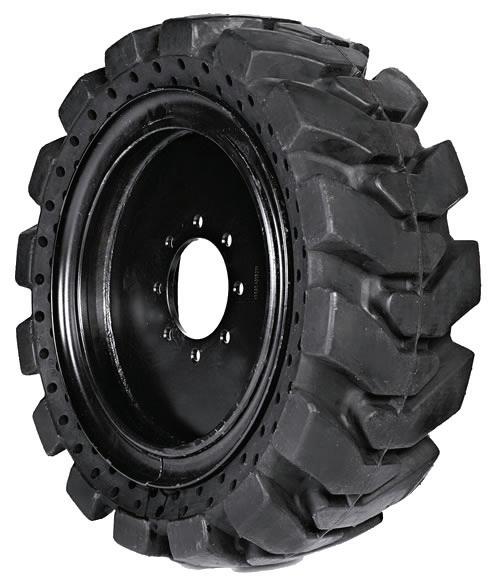


The use of leaf blowers is increasingly under attack in communities across the country. Some are calling for a blanket ban on this equipment, regardless of its power source. Many of the arguments for a leaf blower ban are based on emotions, not facts.
The Outdoor Power Equipment Institute, in conjunction with the National Association of Landscape Professionals, is providing this fact sheet as one tool to assist landscapers in educating their local community leaders, residents, and other stakeholders on the vital role this equipment plays in their communities, misconceptions about its design, and the importance of the people using the equipment.
Fact: Leaf blowers do more than just blow leaves. They are used by landscapers as well as homeowners and other business owners to clean parking lots and sports stadiums, remove snow, clean gutters, and clear flammable debris from around buildings during fire season.
Business owners want clean parking lots and landscapes, communities want neat and clean parks free of debris that can harbor insects and pests, and homeowners want attractive front yards. Leaf blowers are often the best equipment to achieve those goals.
• According to the California Landscape Contractors Association, it takes about five times longer to clean up a landscape site with a rake or broom than a leaf blower.1
• Manually cleaning a site takes longer, which results in higher manpower costs. Those costs are ultimately passed on to the customer – whether that is a homeowner, HOA, or municipal government.
• Using a leaf blower instead of a hose
to clean city sidewalks, driveways, and other areas saves potable water.
• Many large-scale projects, like parking lots, stadiums, or playgrounds, simply can’t be done by hand in a reasonable amount of time.
Fact: Manufacturers have invested millions of dollars and more than 15 years of research into the development of quieter leaf blowers. Many modern leaf blowers are as much as 75 percent quieter than blowers manufactured just a decade ago.2 Today, landscapers have access to blowers, both gas and electric, that are quieter than considered acceptable in many cities and municipalities.
And when we use this equipment in a safe and courteous manner, we further reduce the impact on our community and our neighbors.
Safe and courteous use means:
• Being aware and sensitive to our surroundings and time of day and planning our work accordingly.
• Making sure bystanders, including other operators, are at least 50 feet away, and ceasing blowing if we are approached.
• Using reduced-noise blowers in noise-sensitive areas.
• Using the blower at the lowest possible power needed to accomplish the task.
• Avoiding using more than one blower at a time – especially in neighborhoods
Myth: Leaf blowers produce excessive emissions
Fact: Equipment manufacturers have been working with the U.S. EPA and California Air Resources Board for nearly two decades to reduce small engine emissions – the same small engines in leaf blowers. And they have accomplished a lot: Gas-powered small engine emissions have been reduced by as much as 90 percent.3 That’s a number we are proud of. And as landscapers we now have access to battery-powered blowers that have zero exhaust emissions to meet many of our needs.
Myth: Leaf blowers produce excessive dust and debris.
Fact: Studies have shown that a leaf blower, when used properly, generates no more suspended dust and debris than a broom. The San Joaquin Valley Air Pollution Control District in California commissioned a study that concluded daily driving of automobiles generates 100 times more dust than leaf blowers.4

Again, we practice safe and courteous use of our equipment. This means:
• Using the lowest possible throttle speed to get the job done and reduce dust and suspended particles.
• Wetting very dusty areas prior to blowing.
• Checking wind direction and intensity
so dust and debris aren’t moving toward open windows or doors.
• Starting with the nozzle close to the ground at first – then raise it to a height where it generates the least amount of dust.
• And if the debris is excessively dusty – like construction debris, dry topsoil, or large amounts of gravel –considering using a different tool for that particular job
Myth: A leaf blower ban or restriction is the only way to address the issue.


Reality: A leaf blower ban is not only a
severe and unnecessary remedy, but is also one that is expensive and difficult to enforce. A more reasonable course of action is for landscapers to use the most modern, efficient, and to follow industry best practices for safe and courteous use. As residents, business owners, and employers in our communities, we want to work together with community leaders, homeowners, equipment dealers, and other stakeholders to find common ground and compromise, and to develop ordinances that focus on permissible hours of operation, as well as safe and courteous use of equipment, while allowing us the freedom to choose the best equipment to complete our work.
1. California Landscape Contractors Association: http://www.clca.org/leafblowers/index.php
2. City of Long Beach Memorandum, January 10, 2017, Kelly Colopy, “Early leaf blowers averaged about 78 decibels, with some machines measuring even louder…. Many new blowers are at or below 65 decibels. For every six-decibel reduction, sound intensity is actually reduced by 50 percent. That means many of today’s units are four times quieter than older blowers.”
3. U.S. EPA Regulatory Impact Analysis and Regulatory Support Document, (Phase 1) Control of Air Pollution; Emissions Standard for New Non-Road Spark-Ignited Engines at or Below 19 kW, May 1995 “All of the prototype engines meet their respective standards. The actual percentage reductions in emissions ranged from 1 to 94 % for HC and 10 to 82 % for CO”; U.S. EPA Final Regulatory Impact Analysis, Phase 2 Final Rule: Emission Standards for New Nonroad Handheld Spark-Ignition Engines At or Below 19 kW, March 2000; U.S. EPA 2018 Small Spark-Ignited Engine Certification Database.
4. More fuss than dust, leaf blowers not big polluters, study says. Mark Grossi (technical contributions by Fitz, D.), Fresno Bee, February 23, 2006 “The first dust study ever done on leaf blowers portrays them as an insignificant polluter in the San Joaquin Valley, one of the nation’s dirtiest air basins. … Daily air dust-up tons per day: Agriculture 91.33, Paved Roads 62.66, Construction 14.09, Leaf Blowers 0.52.”



Whether you’re just starting a landscaping company, purchasing enclosed trailers for your lawn care outfit, or looking for a fresh way to re-brand your tree service, vehicle wraps are one of the most cost-effective ways to get exposure
This mobile signage has the potential to reach thousands of people in your local community each and every day.
Vehicle signage had its origins in time-consuming, costly, and permanent hand-painting. It was a big investment 20 years ago that not only meant having your vehicle down, wallet emptied, but also a truck shackled to your company until it was being held together by duct tape.
However, vehicle wraps have come a long way. This artform and advertising media now can be installed in just a few hours, designed to fit varying budgets, and can even serve as temporary signage on trucks and trailers leased for only a few years. The simple logo can now be a multi-faceted message covering any portion of a truck, trailer, or piece of equipment.
The image above is a great example how our client, Outback Landscape, uses bold colors to get recognized each day. The vinyl is even reflective, so it can be seen in the early morning hours or at night!
In addition to working in marketing for the green industry for the past couple decades, I have also ran a sign shop for over 10 years, lettering vehicles just like the ones we’ll feature in this article. I’ll give some tips on how to get even more bang for your buck with vehicle wraps.
Although some terminology is used interchangeably, these various forms all employ using vinyl film that adheres to nonpourous surfaces like automotive paint and glass. Here’s the difference:
• Wraps: This term gets its name from covering large areas (partial wrap) to an entire truck or trailer (full wrap) with lettering, printed logos, pictures and more.
• Graphics: This name can be used interchangeably, not indicating one way or another the placement or inclusion of design elements.
• Truck Lettering: The old terminology where logos were simply placed on the 2 side doors is where “lettering” got its name. Many sign companies will use this term to convey that a simple logo and lettering is applied to a small area.
(Here’s a great example of a clean logo with only 2 colors. Our client, No Ka Oi Landscape Services in Hawaii, has a one-of-a-kind logo that no one will forget! Tips: If you can legally move those numbers to above the front tire, they won’t distract from the logo. Using the purple color, in a thinner font could help as well.)

Exposure: Think about how many people see your company’s fleet each day. Even if you have but one pickup truck, hundreds, if not thousands of people see it in any given day. In a single year, one vehicle alone could receive hundreds, thousands, or a million advertising impressions.
In a few seconds, landscaping vehicle wraps can communicate who you are, what you do, and how to reach you. The more often a prospect sees your company’s brand, the more likely they will be to remember it when searching for a provider.
Return on Investment: Placing ads in magazines, phone books, or PPC advertising are marketing initiatives that cost you every single month, year after year. Unlike these mediums, lawn care vehicle wraps are paid for one time, and last for 5-12 years.

(Think you can only put one logo on the same side of your truck? Not so if it’s this large. This is a great example of how just a 2-color logo and some white space make a great statement for our client and commercial landscaping contractor in Washington D.C., Level Green Landscaping. Good job keeping those USDOT numbers out of the way too! Did you ever think about using that space above the cab or on the front? Another logo would look sharp there!)

Today’s vehicle signage is semi-permanent. It can withstand typical washing and use and be removed years later with a little bit of heat and a lot of elbow grease. So long as the paint behind the graphics is properly applied, you can literally heat the vinyl film up and peel it right back off of your vehicle.
If you have landscaping trailer wraps or truck graphics applied to the entire painted surface of your vehicle, the film will actually preserve the paint behind it, protecting it from the fading of UV light. However, if you choose to have only portions covered, it means only those portions being preserved. When later removed, you’ll be able to see that these areas did not fade. This can sometimes be buffed out by a body shop.
There may be some reasons why landscaping companies, lawn care providers, or tree services may not want to install vehicle wraps or lettering:
• If the trailer or vehicle’s paint integrity is poor. Removing vinyl on a cheap paint job could actually peel off paint layers.
• If you consider your personal use of the vehicle in the evenings or weekends more important than advertising your business during the week (Don’t even go with magnets. Nothing says I may be out of business next week, or a painter on the weekends, like a set of magnets).
We all know a classy job when we spot one. It’s simple, clean, and communicates the perfect amount of information. Go overboard and people may be confused or get the wrong message. Here are some design elements to keep in mind as you talk to a sign shop about landscaping truck wrap ideas:

(Client and commercial landscaping company, Native Land Design in Texas, shows off a perfect way to use background images without distracting from the logo. Leaving a phone number off of your trucks and trailers won’t get you more calls, which may have been a deliberate move from Native since they service a lot of commercial properties and may not want too many calls from residents or tenants.)

• If you’re selling the vehicle in the next 12 months. Adding graphics, particularly a full-wrap may not get you much ROI after paying to remove the graphics after a short time span. Go with a small logo that is less expensive and easier to remove.
Get a nice logo. When people see your company logo, they should remember you.
• Don’t include too many pieces of information. Resist the urge to make designs too busy. Logo, phone, website, tagline, and subtle imagery. If your vehicle is large enough, or you are having enclosed landscaping trailer wraps done, you may have more real estate for bullet points, etc. Resist overcrowding small vehicles.
• Use as many sides of vehicles and equipment as you can. The backs of trailers and vehicles are an absolute must. You can even have some fun on the hood or above cabs in the front
• Don’t be too colorful. This is a subtle balance that a good vehicle wrap designer will have an eye for. If possible, stick with 2-3 colors for main elements.
• Make sure images don’t overpower your branding. If your images are busy, reduce their opacity so they don’t distract from the more important company info.
• Use very large, high resolution professional images. There’s nothing more tacky than blurry, DIY photos of your work driving around town.
• Consider vehicle purchases by their ability to be wrapped.
You may have a truck with great functional use, but it could have a tiny area for a logo. It’s an important part to consider.
• Include the necessary license, DOT, and regulatory numbers. Don’t make them any larger than they need to be and make sure they are placed to not distract from the more important design elements.
• Remove vehicle emblems and model numbers if possible. If you have a giant “F-350 Super Duty” decal or emblem on your truck there is no reason you should design your wrap or lettering around it. These can be removed with a little heat and some gentle prying. You’re advertising for your business, not for Ford.
• Be aware of typical wear and have a plan. If you have areas where vibrating hoses lay, or latches that swing it may wear off vinyl graphics. In some cases, adding some thicker overlaminate could help to provide some protection, or your designer can place elements strategically to not interfere.
• Train your team how to properly wash vehicles and equipment. Getting too close with a pressure washer or vigorously scrubbing vinyl with a stiff brush (particularly when it’s cold) can damage it. Be sure they know how important it is to take a little extra time to do it right.
• Inspect your fleet for wear and repair graphics regularly. While your fleet isn’t being used as heavy during certain times of the year, have a team member inspect each piece and get a plan together to repair missing numbers, letters, etc.
• Put a logo on everything you can! Seriously, why not have branding on mowers, trailers, aerators, and more? If you’re on a property, visitors can see you.


If you plan to price out landscaping vehicle wraps, get a couple preliminary estimates. Know what portion of the vehicle or trailer you intend on covering, and a basic idea of the design concept. This should be enough for a general quote.
The cost will be based on design time, materials used, and difficulty of installation. Wrapping around corners and over door handles, etc. will add to the labor time. A simple design of some logos and phone numbers on a pair of truck doors could start as low as $250-$350. Throw in a tailgate, and you’ll approach the $500-$600 mark.
Partial to full wraps can range from $800 and up on a partial wrap on an economy car (like this sales vehicle wrap from our client, Highgrove Partners) to wrapping an entire box truck for $6,000-$8,000. It all varies on scale and difficulty.
Be sure to ask for references of other local companies who your sign shop installed graphics for a few years ago. Call
them and ask how their work held up. It’s easy to make it look great in the beginning, but poor workmanship could lead to peeling or fading elements.
Ask for any guarantees on workmanship or materials. Not all vinyl films, inks, or installations are the same. Some materials could last as little as 4-5 years before they start fading and some vinyl films may endure for 10-12 years.
We’d love to see examples of your awesome fleet graphics! Email us some pictures and we will either share them on social media or add them to this article. With the right choices, it won’t be long until people will be letting you know that they see your mobile billboards everywhere!

For more helpful branding tips and advertising advice for your landscaping, lawn care, or tree service company, feel free to subscribe to our blog for regular tips.
Chad is the Vice President at Landscape Leadership. Prior to joining our team he served as a marketing manager for one of the Top 150 Companies in the Green Industry. In addition to his vast marketing experience, he also has held certifications such as an ISA Certified Arborist and Landscape Industry Certified Technician. He currently resides in beautiful Lancaster County, PA.

Hydrangea paniculata
A dwarf version of best-selling Quick Fire® hydrangea with the same early bloom time, on a habit that is about one-third the size. Flowers age to deep burgundy red before other varieties even start to bloom, making it a great season extender.


Early blooming
Brilliant color

A.N.T. Nursery, Inc.
Nicholas Iadevaia
Monroe Township, NJ
Choppers Landscaping & Masonry, Inc.
Shawn Kube
Linden, NJ
Christensen Landscaping, Inc.
Neil Christensen Hillsdale, NJ
Country Estate Fence, Inc.
Taylor Cooper
Uwchland, PA
Denville Beautification Committee
David Sipple
Denville, NJ
Direct Fence
Chris Sibeni
Carlstadt, NJ
EcoQuip
Steve Weiss
West Nyack, NY
Emerald, LLC
Bryan Friedenberger
Boonton, NJ
Evergreen Landscape & Design
Matt Rozell
Butler, NJ
Evergreen Plantscapes, Inc.
Gregory Hanley
Freehold, NJ
Ewing Irrigation
Chris Rhodes
Franklin Lakes, NJ
Finishing Touch Landscape Construction, LLC
Frank Davis
Boonton Township, NJ
Golden Wolf Landscape & Design, LLC
Marcus Celiano
Long Valley, NJ
High Bridge Stone Co., Inc.
Balaji Ravi
Port Newark, NJ
Hortus Life, LLC
Ximena Rua-Merkin
Bloomfield, NJ
State Farm Agent
Joe Nachbaur
Wayne, NJ
JSA Landscape Construction
Bobby Arruda
Lafayette, NJ
Magnolia Garden Village
Patrick Conahan
Audubon, NJ
Mauro Brothers Landscaping, LLC
Salvatore Mauro
Frenchtown, NJ
The Modern Group
Mark Dombrowski
Edison, NJ
New Meadow Landscaping & Hardscaping, LLC
Marco Lopez
Trenton, NJ
Northern Shore Property Maintenance, LLC
William Grieco
Waterford Works, NJ
Northern Valley Stone
Billy Falkenstern
Norwood, NJ
Oliver L.E. Soden Agency
Matthew Dewey
Jamesburg, NJ
Orange Pavers
Viktor Kolesnyk
Stroudsburg, PA
Patriotic Insurance Group
Rob Bowen
Chester, NY
Pedro Tellez Landscaping
Pedro Tellez
Long Branch, NJ
Pods Landscaping, LLC
Michael Podmokly
West Milford, NJ
Rahn Landscaping, LLC
Matt Rahn
Williamstown, NJ
RN Landscape Services
Edwin Correa
Randolph, NJ
S. Scott Construction and Design, Inc.
Larry Baills
Franklin Lakes, NJ
Sierra Landscape Management Services, LLC
Tom Wynkoop
Middlesex, NJ
Speedy Tortoise Landscaping
Christopher Zelley
Randolph, NJ
Stone Creek Landscape & Construction
Michael Carr
Mendham, NJ
Visionscape Design
Greg Imhoff
Ringwood, NJ
Wrangld, LLC
Andy Crahgan
Manasquan, NJ
Zoozah, LLC
Jared Kaplan
New York, NY


Owner, John Mikulik, started landscaping as a teenager during the 90s working for his father’s company in Vernon, NJ. After graduating from Vernon High School he went to college, where he earned a Bachelor’s degree in Earth Science and Education from Kean University. Years later, he earned a certificate in Landscape Design and Business from County College of Morris. John has been in the landscaping industry for over 20 years working both part time in his early years and then full time.
Mikulik Lawn and Landscape has grown from being an owner/operator lawn maintenance business to a team of two maintenance crews, two landscape install crews, a pesticide tech, and an office manager.
For more info, visit www.mikuliklawnandlandscape.com
“We are a local small business, not a franchise. We live in the community and care about the area and our customers.”
Fisher & Son Company, Inc. is a, fifth-generation, family owned and operated ‘Green Industry’ corporation providing goods and services to turf and horticulture professionals throughout the Mid-Atlantic region. With two warehouse/customer service centers, the Exton, Pennsylvania based organization serves customers throughout PA-NJ-DE-MD-VA-DC.
Established in 1928 as successor to Thomas, Haines and Company (founded in 1895) Fisher & Son Company originally operated in Malvern, PA as a flour and animal feed mill. As the surrounding rural, agricultural based Southeastern Pennsylvania economy and landscape transformed into a major East Coast residential and business corridor, the company adapted to meet the needs of the new markets created by this evolution.
From 1928 to 2006, Fisher & Son was headquartered in the quaint Philadelphia suburb of Malvern, PA. In 2007, the corporate headquarters were relocated to a larger, more contemporary office and warehouse facility in nearby Exton. Through the years, the company has grown from producing and supplying animal feeds to distributing a superior line of professional turf and horticultural products.
Now based in Exton, Pennsylvania, FSC offers a complete line of products that include turf seed, fertilizer, fungicides, herbicides, insecticides, adjuvants, soil amendments, biological pest controls, soil testing services, ice melters and other products for the ‘Green Industry’ professional in golf, lawn care, landscape, sports turf, arboriculture and municipal property management professionals.
For more info, visit www.fisherandson.com.
1884 Thomas Fisher becomes an employee at Thomas & Haines.

1894 Thomas Fisher becomes a partner.
1908 John Nolan is employed at Thomas, Haines & Co.
1915 Levi Thomas withdraws. Thomas Fisher and John Haines continue business.
1918 John Haines retires. Thomas Fisher and nephew John Nolan form Fisher & Nolan (as seen in photo).
1928 Nolan withdraws. Partnership of FISHER & SON CO. formed by Thomas and his son, Guilford.
1929 The Great Depression strikes, but it doesn’t stop Thomas from serving his customers and Fisher & Son lives on.
2007 Corporate headquarters relocated to a new facility in Exton, PA

“Through the years, the company has grown from producing and supplying animal feeds to distributing a superior line of professional turf and horticultural products.”
Fisher & Son’s Fairfield, NJ location

In the mid-summer of 2020, I reached out to our members to ask about their most memorable customers. I expected horror stories of the worst, most demanding, craziest and funniest customers. What I ended up receiving was truly amazing. Most of the stories you sent in to us were heartwarming and spoke of your favorite customers, those that took time to reach out and tell you what an impact you had on their lives, those that became like family and those that became lifelong friends. I also received some funny and wacky customer stories, but even those didn’t talk of the angry and discontented customers I had expected. I decided that instead of creating one story, I will include a few in each issue of The New Jersey Landscape Contractor. So, keep those stories coming to me, the good, the bad and the ugly. You can send your story to gwoolcott@njlca.org (along with pictures if applicable) and I will include them in this column in future issues. Thank you all for brightening our days with some of your tales from the landscape side!
~ Gail Woolcott, Executive Director
This happened right after 9/11. I was working for PSE&G as their landscape maintenance contractor at a site in Sewaren.
They needed a delivery of ¾” clean stone to be delivered. So, calling the quarry, they tell me someone will be there between 7am and 12 noon. Very broad, and what choice to I have? It was
a nightmare, as I had to be there to accept delivery and let the driver know where to dump the load.
So, multi-taking as I do, I head to the site at 7am and I bring work with me, since I don’t know how long this will take. As I’m sitting outside at a picnic table waiting for the delivery, I decided to do a site audit, to make sure the crew was hitting everything they were supposed to be doing.
I’m walking around the site, which is large and backs up to the Arthur Kill waterway and I’m on my phone, doing work.
The quarry delivery arrives at noon, delivers the load to where I direct and all seems good. The next day I am talking to my contact and he tells me of his conversation with his boss. His boss had asked him “Dimitri, who was that woman walk-
Dimitri says, “Oh that’s Shelly, our landscape contractor. We were getting a delivery and she needed to direct the quarry as to where it should go.”
The boss says,”Dimitri, are you crazy? We are on high alert, We had snipers on the roof and she was in the cross hairs!”

I of course tell Dimitri, that I always let you know when I’m on site, in addition to signing In at the office!!!!!!! Talk about having a meltdown.
I hope the snipers could read lips when I was on my cell phone, because there was concern at that time about women using their cell phone to detonate ships traveling along the Arthur Kill, possibly blowing up bridges.








